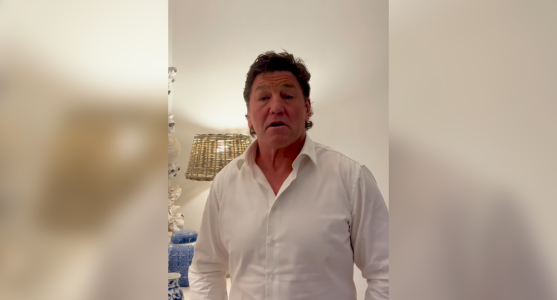NRL legend battles terrifying symptom of brain disease as fans rally in support
By
- Replies 7
The recent revelation has shaken the world of rugby league from NRL great Mark Carroll, who has courageously opened up about his ongoing battle with a suspected case of chronic traumatic encephalopathy (CTE).
The condition, which has cast a shadow over the post-retirement lives of many athletes, is now manifesting in a new and distressing symptom for Carroll: anxiety that is affecting his voice.
CTE, a degenerative brain disorder often associated with repeated head traumas, has been a growing concern in contact sports.
It's a form of dementia that can lead to a range of neurological symptoms.
Unfortunately, it can only be definitively diagnosed post-mortem.
Carroll, a former Panthers, Souths, and Sea Eagles player is among rugby league veterans who have faced this challenge.
He joins notable figures like Wally Lewis, Steve Mortimer, and Mario Fenech, all of whom have shared their struggles with the effects of CTE in their lives after the game.
At 57, Carroll took to social media to address the noticeable change in his voice, which fans had picked up on during his radio and TV appearances.
In a heartfelt video posted to Instagram, he explained that the change was not due to physical injury to his throat but rather a symptom of the anxiety he's experiencing as a result of CTE.
The anxiety has caused a tightness throughout his body, constricting his throat and altering his speech.
'I just wanted to explain why I sound like this,' Carroll said in the video.
'I wish it was from getting hit in the throat like my great mate Geoff Toovey or Gary Larson.’
‘Unfortunately, it's the symptoms of CTE. I've got anxiety. Why? I've got no idea.’
‘But I'm so tight right through the body, and that's why I've got this bloody throat (issue). To those who have texted me after hearing me on radio and Fox, I'm doing my best to be the best.'
The NRL community has responded with an outpouring of support for Carroll, with fans and pundits sending well-wishes and expressing gratitude for his openness about his condition. Carroll's advocacy continues beyond sharing his own story.
He has been vocal in urging the federal government to increase funding for CTE research and support, echoing the sentiments of fellow NRL legend Wally Lewis.
Prime Minister Anthony Albanese has since vowed to take action, signalling a potential shift in how the condition is addressed nationally.
In addition to raising awareness, Carroll has also advocated for changing the NRL's approach to concussion management.
He has criticised the current 11-day stand-down period for players who have suffered a concussion as insufficient, advocating for a minimum three-week recovery time to ensure the long-term health and safety of the athletes.
The issue of concussion in sports is complex and contentious, with implications for player welfare, team dynamics, and the very nature of contact sports.
As Carroll faces his challenges with CTE, his family remains a pillar of support.
His daughter Indi and wife Monique are actively involved with the Sea Eagles community.
 Have you or someone you know been affected by CTE or similar conditions? How do you think contact sports should address the risks associated with head injuries? Share your thoughts and experiences in the comments below.
Have you or someone you know been affected by CTE or similar conditions? How do you think contact sports should address the risks associated with head injuries? Share your thoughts and experiences in the comments below.
The condition, which has cast a shadow over the post-retirement lives of many athletes, is now manifesting in a new and distressing symptom for Carroll: anxiety that is affecting his voice.
CTE, a degenerative brain disorder often associated with repeated head traumas, has been a growing concern in contact sports.
It's a form of dementia that can lead to a range of neurological symptoms.
Unfortunately, it can only be definitively diagnosed post-mortem.
Carroll, a former Panthers, Souths, and Sea Eagles player is among rugby league veterans who have faced this challenge.
He joins notable figures like Wally Lewis, Steve Mortimer, and Mario Fenech, all of whom have shared their struggles with the effects of CTE in their lives after the game.
At 57, Carroll took to social media to address the noticeable change in his voice, which fans had picked up on during his radio and TV appearances.
In a heartfelt video posted to Instagram, he explained that the change was not due to physical injury to his throat but rather a symptom of the anxiety he's experiencing as a result of CTE.
The anxiety has caused a tightness throughout his body, constricting his throat and altering his speech.
'I just wanted to explain why I sound like this,' Carroll said in the video.
'I wish it was from getting hit in the throat like my great mate Geoff Toovey or Gary Larson.’
‘Unfortunately, it's the symptoms of CTE. I've got anxiety. Why? I've got no idea.’
‘But I'm so tight right through the body, and that's why I've got this bloody throat (issue). To those who have texted me after hearing me on radio and Fox, I'm doing my best to be the best.'
The NRL community has responded with an outpouring of support for Carroll, with fans and pundits sending well-wishes and expressing gratitude for his openness about his condition. Carroll's advocacy continues beyond sharing his own story.
He has been vocal in urging the federal government to increase funding for CTE research and support, echoing the sentiments of fellow NRL legend Wally Lewis.
Prime Minister Anthony Albanese has since vowed to take action, signalling a potential shift in how the condition is addressed nationally.
In addition to raising awareness, Carroll has also advocated for changing the NRL's approach to concussion management.
He has criticised the current 11-day stand-down period for players who have suffered a concussion as insufficient, advocating for a minimum three-week recovery time to ensure the long-term health and safety of the athletes.
The issue of concussion in sports is complex and contentious, with implications for player welfare, team dynamics, and the very nature of contact sports.
As Carroll faces his challenges with CTE, his family remains a pillar of support.
His daughter Indi and wife Monique are actively involved with the Sea Eagles community.
Key Takeaways
- NRL legend Mark Carroll has disclosed he's suffering from anxiety due to suspected CTE, affecting his voice.
- CTE is associated with repeated head injuries and has affected many former athletes, including prominent NRL players.
- Carroll has thanked supporters for their kindness and urged those with similar symptoms to reach out, emphasising strength in unity.
- He advocates for increased government support for CTE awareness and treatment and calls for longer stand-down periods for NRL players who suffer concussions.








